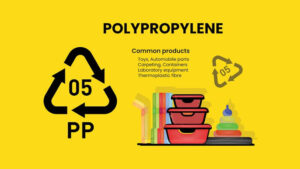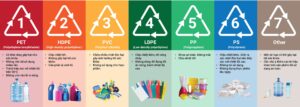As the world faces increasing environmental challenges, the need to develop sustainable solutions is more urgent than ever. One effective approach is the use of recycled plastic materials. This not only reduces the amount of plastic waste but also marks a significant step towards conserving natural resources and minimizing negative impacts on ecosystems.

1. What are Recycled Plastic Materials?
Recycled plastic materials are plastics that have been reprocessed from used products, such as bottles, packaging, everyday items, and other plastic objects. Instead of being discarded, these old plastic products are collected, processed, and recycled into new materials to manufacture other products. This process not only helps reduce plastic waste but also saves energy and resources compared to producing plastics from raw materials.
2. Benefits of Using Recycled Plastics
Reducing environmental pollution: Using recycled plastic materials helps minimize the amount of plastic waste released into the environment. Plastic takes hundreds of years to decompose, causing severe pollution to soil, water sources, and living organisms. By recycling, we can significantly reduce plastic waste, thereby reducing environmental pollution.
Conserving natural resources: Producing plastic from raw materials requires a large amount of petroleum and energy. In contrast, recycling plastics not only reduces the demand for new raw materials but also conserves energy, helping to protect natural resources that are increasingly depleting.
Lowering greenhouse gas emissions: The process of producing plastic from raw materials generates substantial greenhouse gases, contributing to climate change. Recycling plastics helps reduce CO2 and other greenhouse gases, making a positive contribution to global efforts to combat climate change.
Creating jobs: The recycled plastics industry is growing, creating many job opportunities for workers. From collection, sorting, to producing recycled materials, every stage requires human participation, thereby promoting economic and social development.
3. Opportunities for Recycled Plastics
Despite the challenges, the market for recycled plastic materials is opening up many development opportunities. With advancements in technology and increasing environmental awareness, the demand for products made from recycled plastics is rising. Many businesses are investing in research and development of recycled plastic products, ranging from household items, packaging, to construction materials.
Governments and environmental organizations are also promoting policies that encourage the use of recycled plastics. This not only facilitates the growth of the recycling industry but also raises consumer awareness about the importance of using environmentally friendly products.

Recycled plastic materials are an environmentally friendly solution that contributes to reducing plastic waste, conserving natural resources, and lowering greenhouse gas emissions. Although there are still many challenges, with technological advancements and policy support, recycled plastics are set to play an important role in building a sustainable future. Increasing the use of recycled plastic materials is not only the responsibility of businesses but also a societal duty in protecting the environment for future generations.

